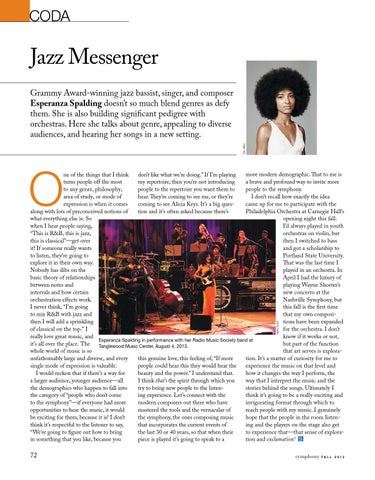CODA
Jazz Messenger
Tom Allen
Grammy Award-winning jazz bassist, singer, and composer Esperanza Spalding doesn’t so much blend genres as defy them. She is also building significant pedigree with orchestras. Here she talks about genre, appealing to diverse audiences, and hearing her songs in a new setting.
O
Hilary Scott
more modern demographic. That to me is ne of the things that I think don’t like what we’re doing.” If I’m playing a brave and profound way to invite more turns people off the most my repertoire, then you’re not introducing people to the symphony. to any genre, philosophy, people to the repertoire you want them to I don’t recall how exactly the idea area of study, or mode of hear. They’re coming to see me, or they’re came up for me to participate with the expression is when it comes coming to see Alicia Keys. It’s a big quesPhiladelphia Orchestra at Carnegie Hall’s along with lots of preconceived notions of tion and it’s often asked because there’s opening night this fall. what everything else is. So I’d always played in youth when I hear people saying, orchestras on violin, but “This is R&B, this is jazz, then I switched to bass this is classical”—get over and got a scholarship to it! If someone really wants Portland State University. to listen, they’re going to That was the last time I explore it in their own way. played in an orchestra. In Nobody has dibs on the April I had the luxury of basic theory of relationships playing Wayne Shorter’s between notes and new concerto at the intervals and how certain Nashville Symphony, but orchestration effects work. this fall is the first time I never think, “I’m going that my own composito mix R&B with jazz and tions have been expanded then I will add a sprinkling for the orchestra. I don’t of classical on the top.” I know if it works or not, really love great music, and Esperanza Spalding in performance with her Radio Music Society band at but part of the function it’s all over the place. The Tanglewood Music Center, August 4, 2013. that art serves is explorawhole world of music is so tion. It’s a matter of curiosity for me to unfathomably large and diverse, and every this genuine love, this feeling of, “If more experience the music on that level and single mode of expression is valuable. people could hear this they would hear the how it changes the way I perform, the I would reckon that if there’s a way for beauty and the power.” I understand that. way that I interpret the music and the a larger audience, younger audience—all I think that’s the spirit through which you stories behind the songs. Ultimately I the demographics who happen to fall into try to bring new people to the listenthink it’s going to be a really exciting and the category of “people who don’t come ing experience. Let’s connect with the invigorating format through which to to the symphony”—if everyone had more modern composers out there who have reach people with my music. I genuinely opportunities to hear the music, it would mastered the tools and the vernacular of hope that the people in the room listenbe exciting for them, because it is! I don’t the symphony, the ones composing music ing and the players on the stage also get think it’s respectful to the listener to say, that incorporates the current events of to experience that—that sense of explora“We’re going to figure out how to bring the last 30 or 40 years, so that when their tion and exclamation! in something that you like, because you piece is played it’s going to speak to a
72
symphony
fall 2013
